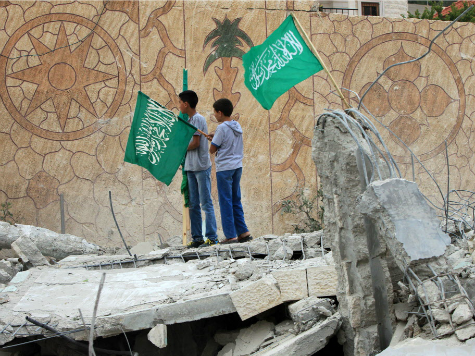Hamas is in trouble. Eventually, barring some cataclysmic event or full-scale Israeli invasion, one of these serial cease-fires will more or less hold and the 2014 Gaza War will sputter to an end. And, sometime thereafter, Hamas will fall from power.
That may seem unlikely with Hamas currently having a firm grip on Gaza. But the deck has never been stacked against Hamas like it is now – militarily, diplomatically, and politically.
Hamas once enjoyed domestic and foreign popularity for its being able to threaten Israel with its rocket arsenal, thousands of fighters, and fiery ideology. But it is now a militarily compromised force: its rocket stockpiles, already shown to be largely useless, are shrunken; its terror tunnel network has been destroyed; and with some 1,000 of its fighters killed, including senior commanders, its military personnel have been weakened.
Hamas, which cannot survive without outside help, has also never been as isolated as it is now. The game-changer from prior years is the new Egyptian regime. The current Sisi government in Cairo is an enemy of Hamas for several reasons, not the least of which is Hamas’s Muslim Brotherhood affiliation. Egypt has been demolishing Hamas smuggling tunnels in the Sinai with the same fervor with which it has been purging Muslim Brotherhood activists from its population.
The Egyptians have destroyed over 1,300 tunnels so far, on their way to eliminating the nearly free flow of smuggled goods that existed in the past across Gaza’s southern border. Gone are the days of the Egyptians looking the other way while goods and arms were easily passed into Gaza. With Gaza’s borders sealed, it will be difficult for Hamas to restock supplies of imported rockets and weapons.
Between shifting regional politics and its mismanagement of relationships, Hamas is now alienated from most of the Arab world. The Saudis, Jordanians, most Gulf States, and the Palestinian Authority have been notably quiescent regarding Israeli military activity in Gaza, giving Israel wide military latitude.
Hamas even managed to anger Iran, its main benefactor and weapons supplier, by not aligning with the Iranian axis in the Syrian civil war. Turkey and Qatar, Hamas’s remaining patrons, are simply not as capable of, or committed to, getting military aid and equipment into the hands of Hamas, especially without Egyptian cooperation.
The European governments, often only fair-weather friends to Israel, have also apparently had enough of Hamas. Though there may be street-level support for Gaza in some cities, the European foreign ministers have come down unanimously on the side of Israel.
Hamas’s poor international standing might not matter so much to its ability to hold power if it enjoyed domestic popularity. But its current war with no gains against Israel has to be taking a serious toll on Hamas’s already-eroded popular support. As a dictatorship, it may not need the support of a majority of the population, but even a dictatorship needs some popular constituency if it is to last.
Hamas was once popular–before it came to power. It won a majority in the 2006 Palestinian Authority parliamentary elections against a kleptocratic Fatah. But since wresting full control of Gaza from Fatah in 2007, it has proven to be every bit as adept at graft and corruption–and every bit as incompetent at governing.
Nothing underscores that incompetence more than the current war. Hamas chose this war, yet what does it have to show for it other than a few score Israelis killed? Hamas has pried no concessions from Israel, no new seaport or airport, no border openings, and no freed terrorists, all of which were stated war aims. Hamas’s war instead has only brought about a lot of domestic death, destruction, displacement, and hardship for the people of Gaza.
How does Hamas now justify to its population the lives lost and the foreign aid dollars and materials diverted to the construction of terror tunnels that have now been destroyed by Israel? How foolish does Hamas look for building and maintaining a huge rocket arsenal that has turned out to be mostly impotent against Israel’s Iron Dome?
Hamas can’t even claim a victory by simply surviving Israeli operations, as Hezbollah was able to do in the 2006 Lebanon war: Israel has wisely kept its stated war aims modest, promising only to neutralize the terror tunnels and provide an extended period of quiet, but not promising to depose Hamas–even if that is Israel’s desired endgame.
After years of oppressive Islamist Hamas rule and weeks of inept Hamas war-making, it is a safe bet that there is significant Hamas-fatigue within the Gazan population.
A post-war Hamas which is militarily weakened, diplomatically isolated, and unpopular at home could be ripe for toppling. Expect to see other organizations, particularly Fatah, soon challenge Hamas for power.

COMMENTS
Please let us know if you're having issues with commenting.